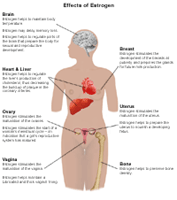Low Estrogen Levels in Menopause

Click Image to Enlarge
What is estrogen?
Estrogen is a kind of hormone that has an important role in the health of females. There are 3 types of estrogen: estrone, estradiol, and estriol. They affect the sexual and reproductive development in females. The ovaries make most of the estrogen in your body. The adrenal glands and fat cells also make small amounts of estrogen.
Estrogen affects the health of all of these things:
Changes in estrogen levels
A person’s estrogen levels fall during perimenopause. Perimenopause is a period of time when a person’s hormones start to change and cause symptoms, before their menstrual period stops fully (menopause). Menopause is when you haven’t had any menstrual bleeding for 12 months.
Symptoms of low estrogen can include:
-
Hot flashes, flushes, and night sweats are the most common symptoms of low estrogen. At times, blood rushes to your skin’s surface. This can give you a feeling of warmth (hot flash). Your face may look flushed. Hot flashes while you are sleeping are called night sweats.
-
Mood swings are another effect of low estrogen. You may feel sad, anxious, or frustrated. Shifting hormone levels and night sweats may disrupt your sleep. This can cause fatigue, which may make mood swings worse.
-
Thinning tissues may cause discomfort. Skin may appear more wrinkled. Thinning in the urinary tract may lead to bladder infections. You may also have an urgent need to urinate. Or you may lose bladder control (incontinence). Thinning of the vagina may cause dryness and painful sex.
Major health risks of low estrogen include:
-
Osteoporosis. Estrogen helps maintain strong bones by preventing calcium loss. Too little calcium can increase the risk of fractures in the spine, hips, and leg and arm bones. People who drink a lot of alcohol, who smoke, who are not active, and who are thin or petite are at greater risk. A family history of osteoporosis may also increase risk.
-
Heart disease. Estrogen made by the body seems to protect against heart disease. It may do this by raising the level of HDL (good) cholesterol in the blood. After menopause, the risk for heart disease rises sharply. Talk with your healthcare provider about ways to protect your heart health.
Hormone replacement therapy (HRT)
Hormone replacement therapy (HRT) can reduce some symptoms of menopause. HRT may be done with a medicine that has estrogen, or medicines that have estrogen and progesterone.
HRT may also help prevent osteoporosis in some people. But it may increase the risk for other health conditions, including heart disease, breast cancer, blood clots in the legs or lungs, and stroke. Not all people need HRT. Talk with your healthcare provider about whether HRT is right for you.
If you’re considering HRT:
-
Talk with your healthcare provider about the symptoms that bother you the most.
-
Ask your healthcare provider about the current research and recommendations about HRT.
-
Ask what your personal health risks are if you take or don’t take HRT.